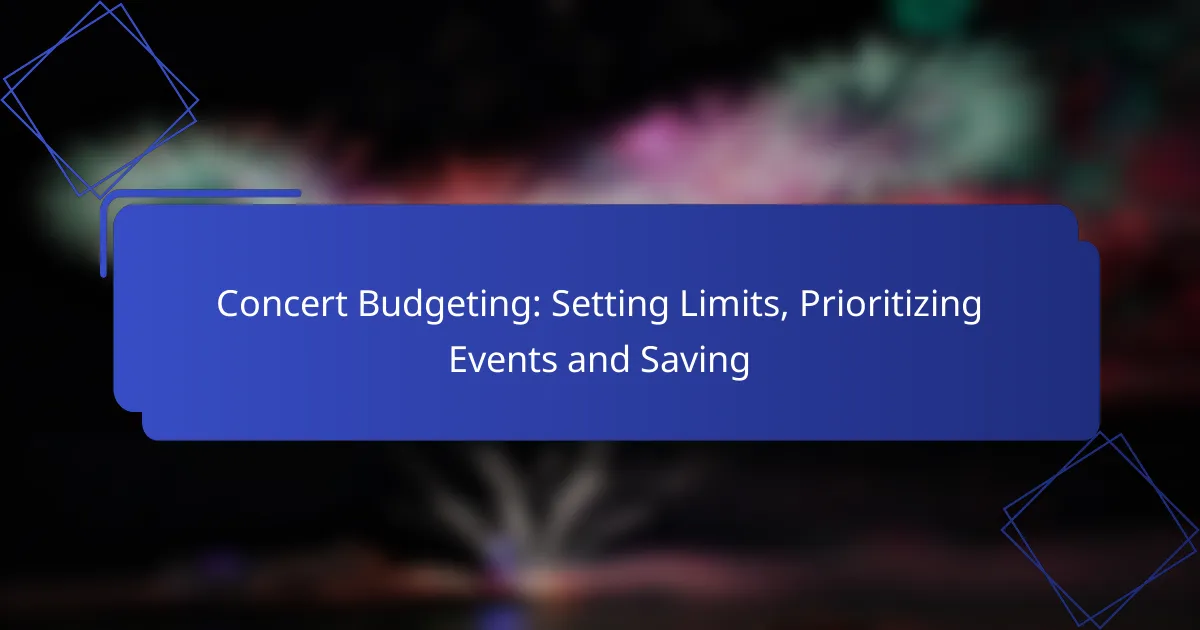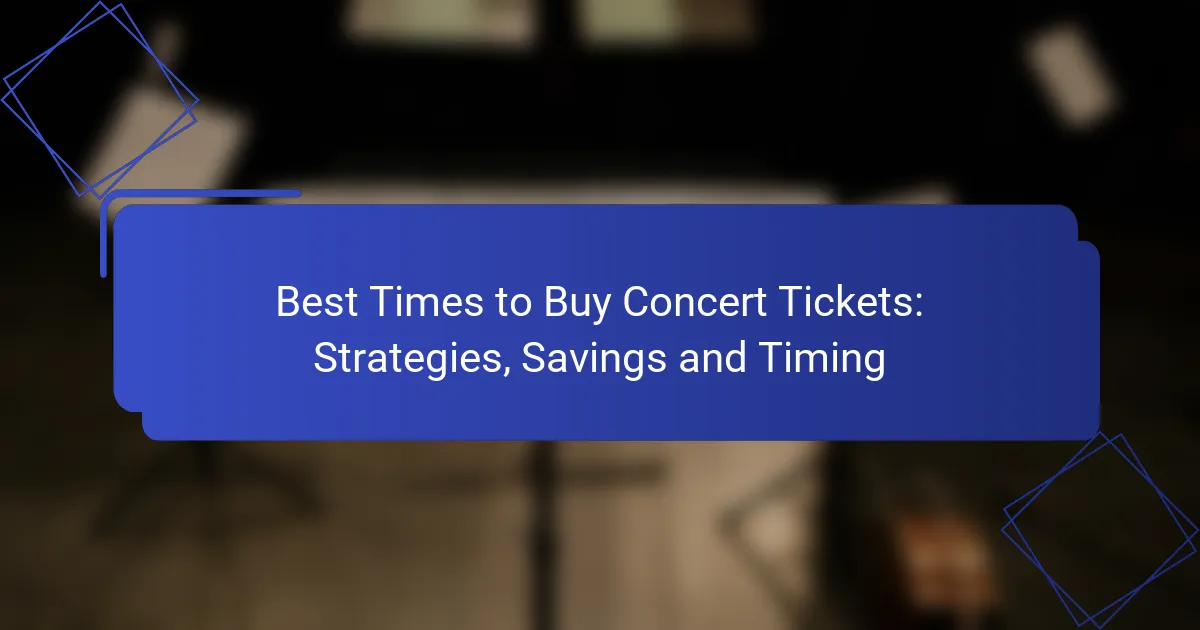Concert budgeting is essential for enjoying live music without straining your finances. By assessing your financial situation and prioritizing events based on your preferences and available funds, you can make informed decisions that enhance your concert experience while keeping costs in check.

How to set a concert budget effectively?
Setting a concert budget effectively involves assessing your financial situation and prioritizing which events to attend based on your available funds. By understanding your income and expenses, you can allocate your resources wisely to enjoy live music without overspending.
Determine total income available
Start by calculating your total income for the period leading up to the concerts you want to attend. This includes your salary, any side income, and other sources of revenue. Knowing your total income helps you establish a realistic budget for entertainment expenses.
Consider setting aside a specific percentage of your income for concerts, typically around 5-10%. This allows you to enjoy events while maintaining financial stability.
Identify fixed and variable expenses
Fixed expenses are regular payments that remain constant, such as rent, utilities, and subscriptions. Variable expenses can fluctuate, including groceries, dining out, and entertainment. Identifying these categories helps you understand how much disposable income you have available for concerts.
Track your spending for a month to get a clearer picture of your variable expenses. This will enable you to see where you can cut back to free up more funds for concert tickets.
Allocate funds for different events
Once you have a clear understanding of your income and expenses, prioritize the concerts you want to attend. Allocate funds based on the importance of each event, ticket prices, and your overall budget. For example, if a major artist is performing, you might decide to spend more on that ticket than on a smaller local show.
Consider creating a simple table to compare ticket prices and associated costs, such as travel and accommodations, for each event. This will help you make informed decisions and avoid overspending on less significant concerts.
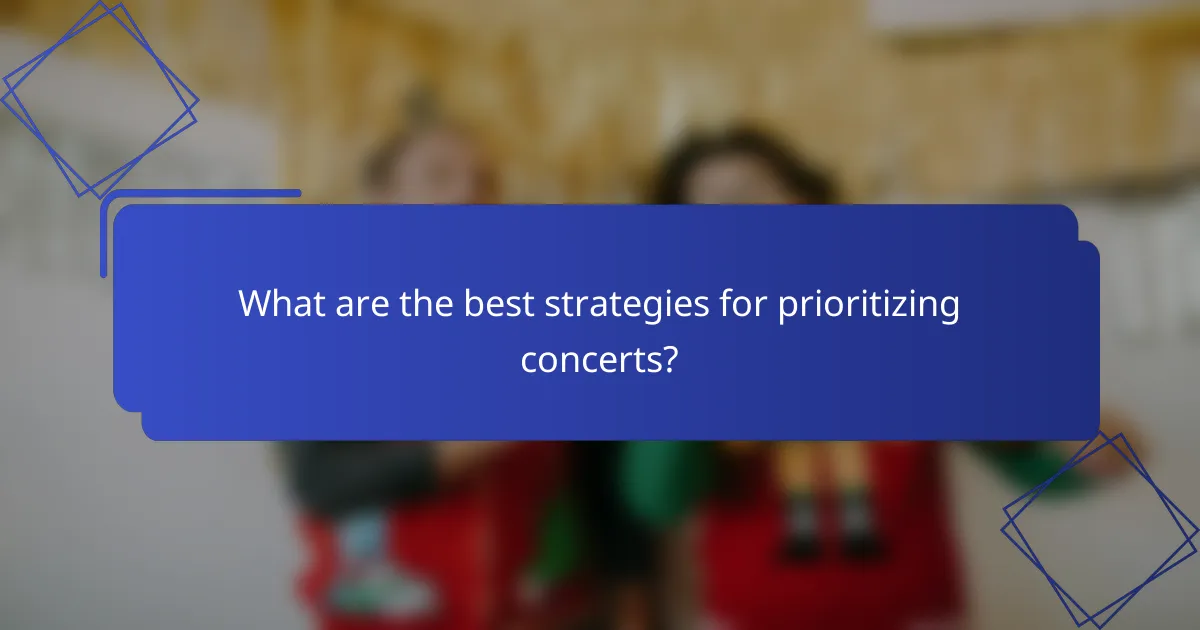
What are the best strategies for prioritizing concerts?
To effectively prioritize concerts, focus on evaluating artist popularity, venue characteristics, and your personal preferences. This approach helps you allocate your budget wisely and ensures you attend events that truly resonate with you.
Evaluate artist popularity and demand
Assessing an artist’s popularity and demand is crucial for prioritizing concerts. Popular artists often sell out quickly, so consider their streaming numbers, social media following, and recent tour success. If an artist is trending, it may be worth prioritizing their concert over others.
Additionally, look for any upcoming releases or significant events that could increase demand. For instance, if an artist is releasing a new album shortly before their tour, their concerts may be more sought after, making it a good idea to secure tickets early.
Consider venue capacity and location
The venue’s capacity and location can significantly impact your concert experience. Larger venues may offer a wider selection of artists but can also lead to a less intimate experience. Conversely, smaller venues often provide a closer connection to the performer but may have limited ticket availability.
Location is also key; consider how far you’re willing to travel and the associated costs. Venues in major cities might attract bigger names but could also come with higher ticket prices and additional expenses like parking or accommodations.
Assess personal preferences and experiences
Your personal preferences and past concert experiences should guide your prioritization. Reflect on the genres and artists you enjoy most, as well as the types of concert experiences you value, whether it’s the atmosphere, sound quality, or crowd size.
Make a list of must-see artists and events, balancing them with those that are less critical. This way, you can allocate your budget effectively, ensuring you attend concerts that will be memorable and enjoyable for you.

How can you save money on concert expenses?
Saving money on concert expenses involves strategic planning and taking advantage of available discounts. By being proactive and informed, you can significantly reduce your overall costs while enjoying live music events.
Utilize early bird ticket sales
Early bird ticket sales offer significant savings for concert-goers who plan ahead. These tickets are typically available for a limited time before the event and can be priced lower than standard tickets, sometimes by 20-30% or more.
To take advantage of early bird sales, sign up for newsletters from your favorite venues and artists. This way, you’ll receive notifications about upcoming sales and can act quickly to secure your tickets at a lower price.
Explore group discounts and packages
Many venues and promoters offer group discounts for concert tickets, which can lead to substantial savings if you’re attending with friends or family. Discounts can range from 10-20% off the total price, depending on the number of tickets purchased.
When planning to attend a concert with a group, check the venue’s website or contact their box office to inquire about available packages. Some venues may even offer bundled deals that include food and drinks, enhancing the overall experience while saving money.
Leverage loyalty programs and rewards
Many ticketing platforms and credit card companies have loyalty programs that can help you save on concert expenses. By accumulating points through purchases, you can redeem them for discounts or even free tickets.
To maximize your savings, consider signing up for a loyalty program that aligns with your concert-going habits. Regularly check for promotional offers that may provide additional savings or exclusive access to presale tickets.
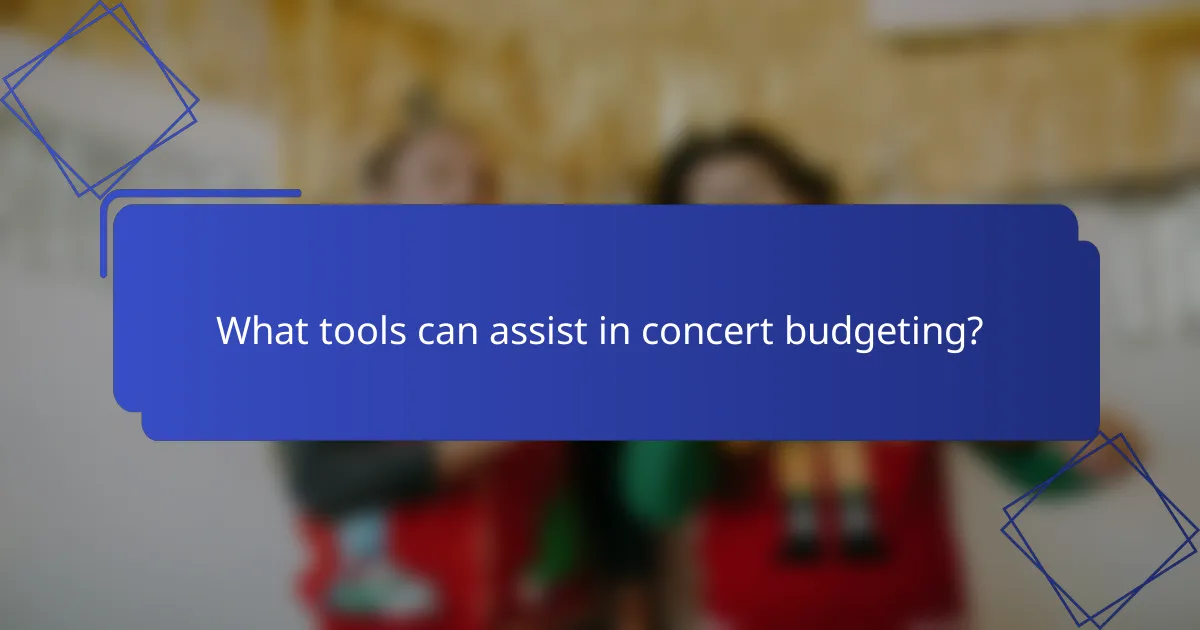
What tools can assist in concert budgeting?
Several tools can help you effectively manage your concert budgeting by tracking expenses and setting limits. Utilizing budgeting apps and spreadsheets can streamline the process, making it easier to prioritize events and save money.
Use budgeting apps like Mint or YNAB
Budgeting apps such as Mint and YNAB (You Need A Budget) offer user-friendly interfaces to help you monitor your concert spending. These apps allow you to set specific financial goals, categorize expenses, and receive alerts when you approach your limits.
Mint is free and connects to your bank accounts, automatically tracking transactions. YNAB, on the other hand, requires a subscription but provides a more hands-on approach to budgeting, encouraging proactive financial management. Choose the one that aligns best with your budgeting style.
Track expenses with spreadsheets
Using spreadsheets to track concert expenses can provide a customizable and detailed view of your finances. You can create categories for ticket purchases, travel costs, and merchandise, allowing for easy adjustments as needed.
Consider setting up a simple table with columns for date, event, cost, and category. This method allows you to visualize your spending patterns and identify areas where you can cut back. Regularly updating your spreadsheet can help you stay on track with your concert budget.
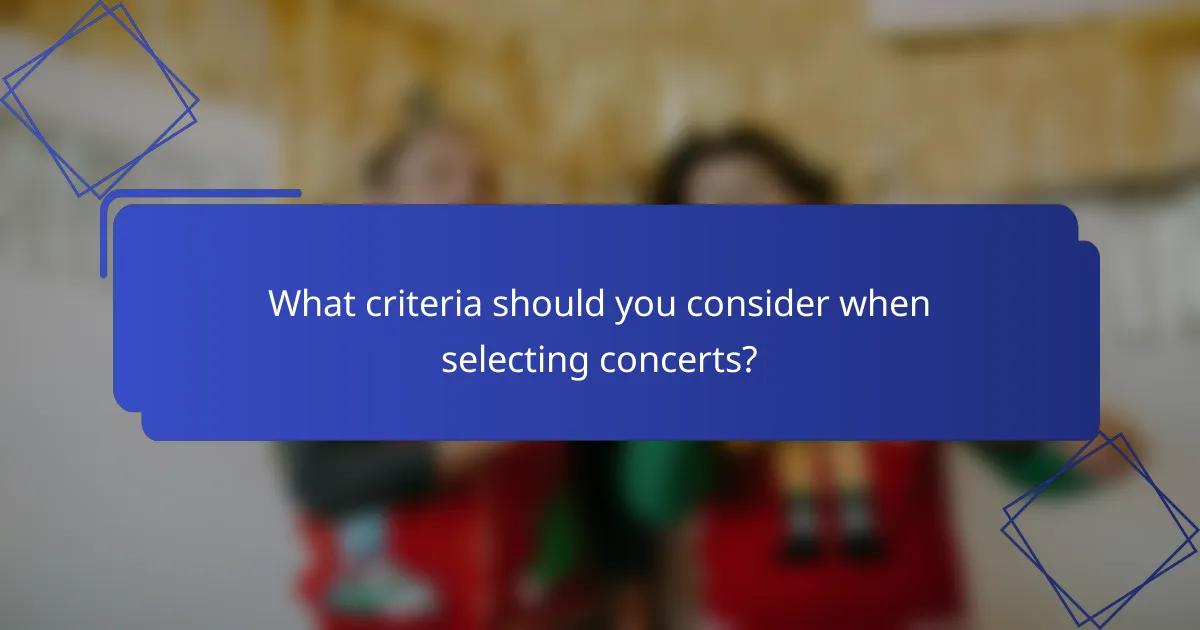
What criteria should you consider when selecting concerts?
When selecting concerts, consider factors like location, ticket prices, and the overall experience you want. Prioritizing these elements can help you stay within budget while ensuring you enjoy the events that matter most to you.
Analyze travel costs and logistics
Travel costs can significantly impact your concert budget. Evaluate the distance to the venue, transportation options, and potential accommodation expenses. For instance, driving might be cheaper than flying, but consider gas prices and parking fees.
Logistics also include timing and convenience. Check if public transport is available and whether it runs late enough for you to return home after the concert. If you plan to stay overnight, look for nearby hotels or consider camping options if available.
Review artist lineups and set times
Artist lineups can greatly influence your decision to attend a concert. Research the performers and their popularity, as well as any supporting acts that might enhance your experience. Prioritize concerts featuring artists you genuinely enjoy to maximize your enjoyment.
Set times are equally important. Confirm when each artist is scheduled to perform, as overlapping sets could lead to missed performances. If you’re attending multiple shows, ensure you have enough time to travel between venues without stress.
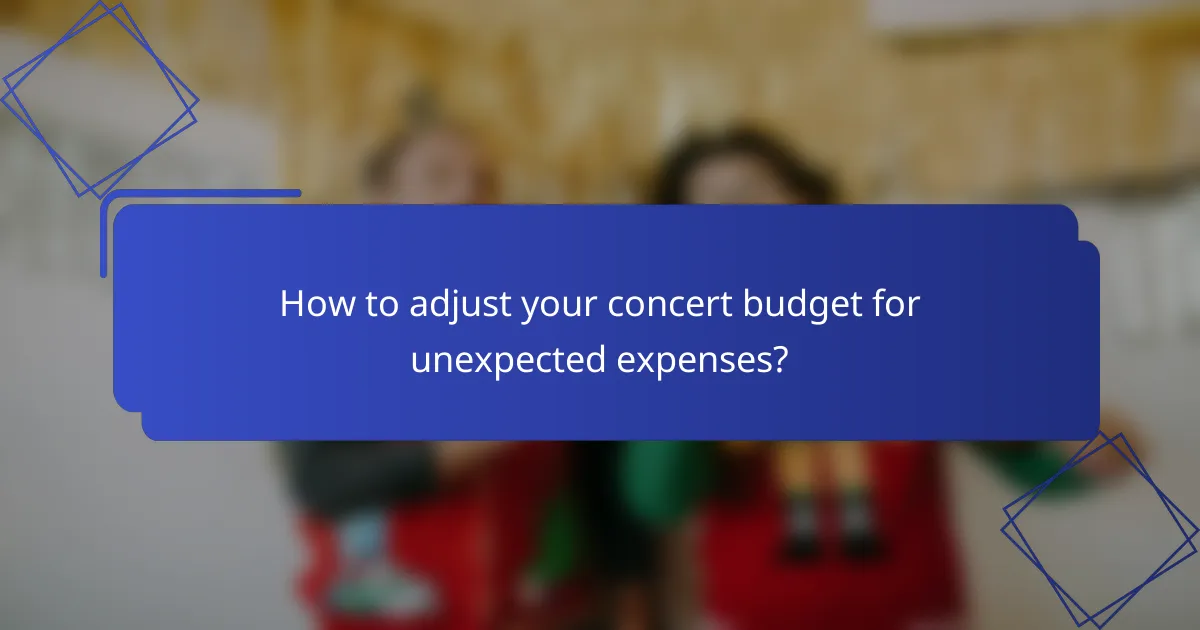
How to adjust your concert budget for unexpected expenses?
To effectively adjust your concert budget for unexpected expenses, it’s essential to plan for contingencies and reassess your financial priorities. This proactive approach helps you manage unforeseen costs without derailing your overall concert experience.
Set aside a contingency fund
Creating a contingency fund is crucial for handling unexpected expenses related to concerts. Aim to set aside around 10-20% of your total concert budget specifically for emergencies, such as last-minute ticket price increases or additional travel costs.
For example, if your total budget is $500, allocate $50 to $100 as a buffer. This fund can provide peace of mind and prevent financial strain when surprises arise.
Reassess priorities and adjust allocations
Regularly reassessing your concert priorities allows you to adjust your budget allocations effectively. Consider which events are most important to you and whether you can shift funds from less critical concerts to cover unexpected costs.
For instance, if a major artist announces a surprise concert, you might decide to cut back on spending for smaller shows. This flexibility ensures that your budget remains aligned with your concert-going goals while accommodating any unforeseen expenses.
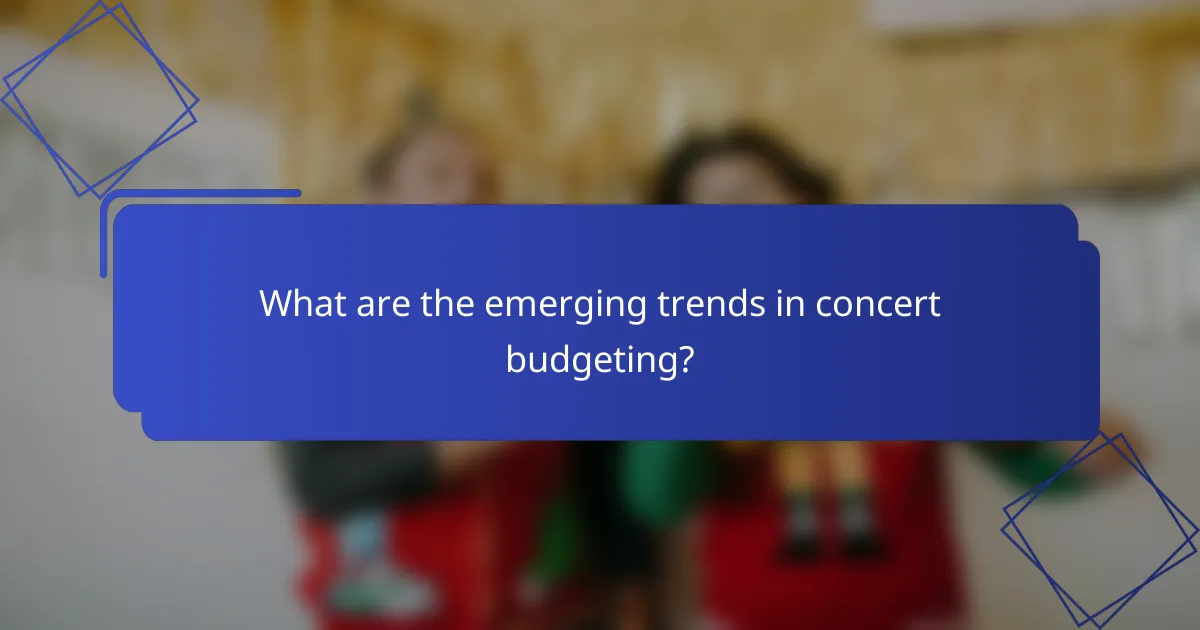
What are the emerging trends in concert budgeting?
Emerging trends in concert budgeting focus on leveraging technology and adapting to changing audience preferences. Key developments include the rise of digital ticketing platforms and the increasing popularity of virtual concerts, both of which influence how budgets are allocated and managed.
Increased use of digital ticketing platforms
Digital ticketing platforms have transformed the way concertgoers purchase tickets, making transactions more efficient and transparent. These platforms often offer features such as dynamic pricing, which adjusts ticket prices based on demand, allowing organizers to maximize revenue while providing fans with flexible purchasing options.
When budgeting for concerts, consider the fees associated with these platforms, which can range from a few percent to over ten percent of the ticket price. It’s essential to factor these costs into your overall budget to ensure profitability.
Growing popularity of virtual concerts
Virtual concerts have gained traction, especially post-pandemic, as they allow artists to reach global audiences without geographical constraints. These events typically have lower overhead costs compared to traditional concerts, as they eliminate expenses related to venue rentals and physical logistics.
When planning a budget for virtual concerts, consider investing in high-quality streaming technology and marketing to attract viewers. Pricing for virtual tickets can vary widely, often ranging from free access to premium packages costing tens of dollars, so it’s crucial to define your pricing strategy based on your target audience and production quality.
